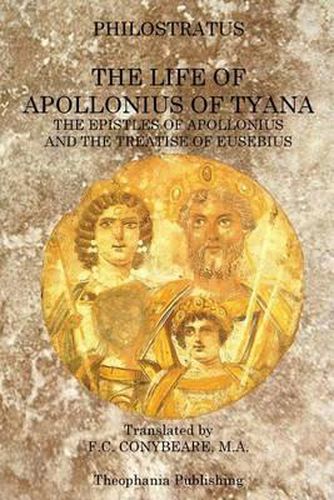The Life of Apollonius of Tyana: The Epistles of Apollonius and the Treatise of Eusebius
M a F C Conybeare

The Life of Apollonius of Tyana: The Epistles of Apollonius and the Treatise of Eusebius
M a F C Conybeare
Thank you for checking out this book by Theophania Publishing. We appreciate your business and look forward to serving you soon. We have thousands of titles available, and we invite you to search for us by name, contact us via our website, or download our most recent catalogues. THE Life of Apollonius of Tyana has only been once translated in its entirety into English, as long ago as the year 1811, by an Irish clergyman of the name of E. Berwick. It is to be hoped therefore that the present translation will be acceptable to the English reading public; for there is in it much that is very good reading, and it is lightly written. Of its author, Philostratus, we do not know much apart from his own works, from which we may gather that he was born in the island of Lemnos about the year 172 of our era, that he went to Athens as a young man to study rhetoric, and later on to Rome. Here he acquired a reputation as a sophist, and was drawn into what we may call the salon of the literary and philosophic Empress Julia Domna, the wife of Septimius Severus. She put into his hands certain memoirs of Apollonius, the sage of Tyana, who had died in extreme old age nearly 100 years before during the reign of the Emperor Nerva, and she begged him to use them for the composition of a literary life of the sage in question. These memoirs had been composed by a disciple and companion of Apollonius named Damis, a native of the city of Nineveh, whose style, Philostratus says, like that of most Syrian Greeks, was heavy and wanting in polish. Besides these memoirs Philostratus used for his work a history of the career of Apollonius at Aegae, written by an admirer of the name of Maximus. He also used the many letters of Apollonius which were in circulation. His collection of these agreed partly, but not wholly, with those which are preserved to us and translated below. He tells us further that the Emperor Hadrian had a collection of these letters in his villa at Antium. Philostratus also possessed various treatises of Apollonius which have not come down to us.
This item is not currently in-stock. It can be ordered online and is expected to ship in approx 2 weeks
Our stock data is updated periodically, and availability may change throughout the day for in-demand items. Please call the relevant shop for the most current stock information. Prices are subject to change without notice.
Sign in or become a Readings Member to add this title to a wishlist.

